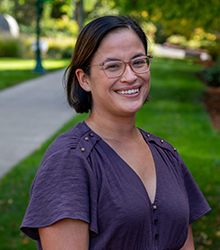
Stephanie Shire
Biography
Stephanie Shire is an Associate Professor in Early Intervention and Early Childhood Special Education. Her research interests focus on the development, adaptation, and real world effectiveness of intervention programs for children with autism and other neurodevelopmental disorders examined through community partnerships in both low and high resource settings. She is interested in the use of effectiveness-implementation hybrid designs (e.g., Shire et al., 2017), and Sequential Multiple Assignment Randomized Trials (SMARTs) to examine both the implementation of the intervention through community practitioners as well as children’s development.
Undergraduate and graduate students play important roles in ongoing research studies. Students who are interested in getting involved in research are welcome to reach out.
This faculty member is interested in having a new doctoral student for the 2024-2025 academic year.
Education
PhD
2013
University of California Los Angeles, LA, CA
Human Development and Psychology
Chair: Dr. Connie Kasari
M.A
2013
University of California Los Angeles, LA, CA
Human Development and Psychology
M.Ed
2010
University of Alberta, Edmonton, Canada
Educational Psychology
B.A
2008
University of Alberta, Edmonton, Canada
Psychology
Publications
Selected Publications
Shire, S.Y. (2024). The Devil in the in Details: Advancing our Collective Understanding of Naturalistic Developmental Behavioral Interventions. Autism Research, 17(1), 7-16. https://doi.org/10.1002/aur.3048
Shire, S.Y., Shih, W., Chang, Y.C., Kodjoe, M., Nodzo, S., & Kasari, C. (accepted, 2024). Comparing the Implementation Context for Early Intervention Services Before and During the COVID-19 Pandemic. Prevention Science. https://doi.org/10.1007/s11121-024-01696-5
Pizzano, M., Shire, S.Y., Smith, T., Lovato, L., Landa, R., Lord, C., Kaiser, A., & Kasari, C. (2024). Profiles of minimally verbal autistic children: Illuminating the neglected end of the spectrum. Autism Research, 17(6), 1218-1229. https://doi.org/10.1002/aur.3151
Shire, S.Y., Arbuckle, S., & Bao, W. (2022). Development and Usability Testing of a Web-based Adaptation of the JASPER Social Communication Intervention. ASHA Perspectives Special Interest Group 1, 7(2), 310-323. https://doi.org/10.1044/2021_PERSP-21-00222.
Shire, S.Y., Shih, W., Barriault, T., & Kasari, C. (2022). Exploring Coaching and Follow- Up Supports in Community Implemented Caregiver-Mediated JASPER Intervention. Autism, 26(3), 654-665. https://doi.org/ 13623613211066132.
Kasari, C., Shire, S.Y., Shih, W., & Almirall, D. (2021). Getting SMART about Social skills interventions for students with ASD in inclusive classrooms. Exceptional Children, 88(1), 26-44. https://doi.org/10.1177/00144029211007148
Fan, L., Thompson-Hodgetts, S., Shire, S.Y., Couture, M., & Zwaigenbaum, L. (2021). The Influence of Disclosure on Peer Engagement and Interactions for a Child with Autism in Summer Camps: A Within Case Mixed Methods Study. Disability and Rehabilitation, 1-12. https://doi.org/10.1080/09638288.2021.1904012
Shih, W., Shire, S.Y., Chang, Y.C., & Kasari, C. (2021). Joint engagement is the mechanism leading to increased initiations of joint attention and downstream effects on language: JASPER early intervention for children with ASD. Journal of Child Psychology and Psychiatry, 62(10), 1228-1235. https://doi.org/10.1111/jcpp.13405
Shire, S.Y., Baker Worthman, L^., & Arbuckle, S*. (2021). Technology-Enabled Adaptation of Caregiver-Mediated JASPER Intervention: Preliminary Examination of Video Conferenced Coaching. American Journal on Intellectual and Developmental Disabilities, 126(5), 421-434. https://doi.org/10.1352/1944-7558-126.5.421
Shire, S.Y., Shih, W., Bracaglia, S., Kodjoe, M., & Kasari, C. (2020). Peer engagement in toddlers with autism: Community implementation of dyadic and individual JASPER intervention. Autism, 24(8), 2142-2152. Doi: 10.1177/1362361320935689
Shire, S.Y., Baker-Worthman, L., Shih, W., & Kasari, C. (2020). Comparison of face to face and remote support for interventionists learning to deliver JASPER intervention with children with autism. Journal of Behavioral Education, 29, 317-338. Doi: 10.1007/s10864-020-09376-4
Chang, Y.C., & Shire, S.Y. (2019). Promoting play in preschools. Teaching Exceptional Children, 52(2), 66-76. Doi: 10.1177/0040059919874305
Shire, S.Y., Chang, Y.C., Shih, W., Bracaglia, S., Kodjoe, M., & Kasari, C. (2019). Sustained Community Implementation of JASPER Intervention with Toddlers with Autism. Journal of Autism and Developmental Disorders, 49(5), 1863-1875.
Shire, S.Y., Tan, A*. (2019). Helping the family communicate with technology. In B. Turns, J. Ramsich, & J. Whiting (Eds.), Systematically treating autism: A guide for empowering families. Routledge
Shire, S.Y.,& Smith, T. (2019). Parent training for social communication. In Johnson, C.R., & Butter, E (Eds.). Parent training in autism spectrum disorders: Evidence-based approaches. American Psychological Association. (pp. 85-116).
Shire, S.Y., Shih, W., & Kasari, C. (2018). Brief report: Caregiver strategy implementation- Advancing spoken communication in children who are minimally verbal. Journal of Autism and Developmental Disorders, 48(4), 1228-1234. doi.org/10.1007/s10803-017-3454-0
Shire, S.Y., Chang, Y.C., Shih, W., Bracaglia, S., Kodjoe, M., & Kasari, C. (2017). Hybrid implementation model of community partnered early intervention for toddlers with autism. Journal of Child Psychology and Psychiatry, 58(5), 612-622. Doi: 10.1111/jcpp.12672
Shire, S.Y., Shih, W., Chang, Y.C., & Kasari, C. (2018). Short Play and Communication Evaluation: Teachers’ assessment of core social communication and play skills with children with autism. Autism, 22(3), 299-310. Doi: 1362361316674092
Research
Dr. Shire’s research includes the development and testing of behavioural intervention practices for young children with special educational needs, focusing primarily on supporting children with autism spectrum disorder (ASD). Through partnership with community stakeholders, she is interested in developing empirical data to help understand how best to support caregivers, teachers, and community early interventionists in their everyday interactions with children on the spectrum. This includes focusing on clinical care questions such as if, when, and how to augment or adapt intervention programming based on the needs of individual children as well as the needs of the adults who care for them.
